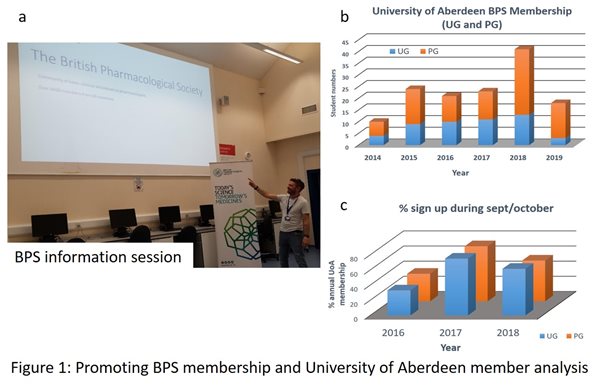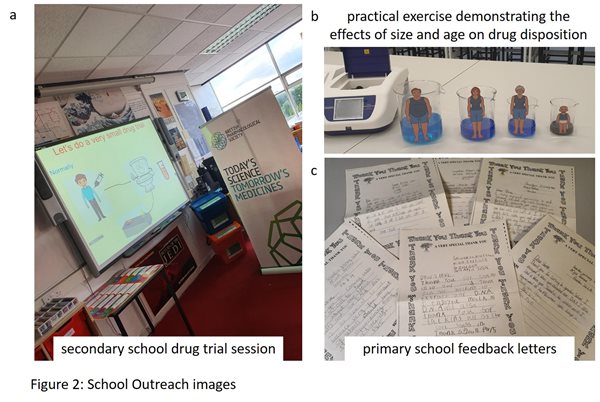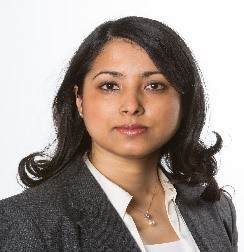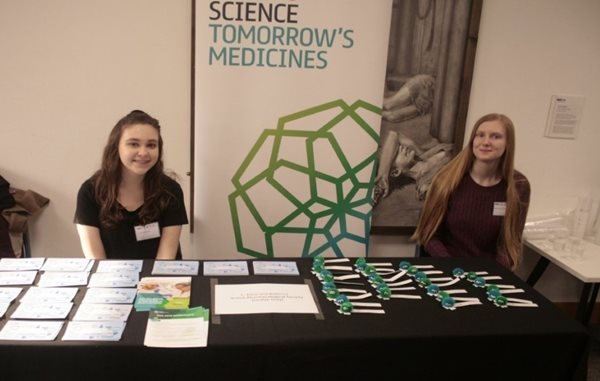Dr Samir Ayoub, University of East London
At the University of East London (UEL), we successfully ran this year’s Pharmacology Summer School for Year 12 students on 27–28 June. This hands-on outreach activity is aimed at generating awareness and igniting interest in pharmacology for students planning on going to university (see the July 2017 issue of Pharmacology Matters for a full account). The summer school helps students not only gain practical experience on pharmacology and drug development, but also hone their transferrable skills.
On the first day, the students worked in small groups to conduct organ bath experiments using ileum tissues. On the second day, they worked in the same groups to analyse their results and to eventually present their ‘drug screening’ experimental data to a pretend pharmaceutical company and group investors – actually academics and UEL pharmacology alumni.
It is always a pleasure to see how much these students learn during the 2 days of summer school and how they handle the questions at the end of the presentations. It is also a demonstration of the leadership and mentoring skills of our undergraduate pharmacology students, as each of these students gets to lead a group of Year 12 students throughout the whole summer school.
Dr Steve Tucker, University of Aberdeen
BPS membership: Initiatives and analysis
The beginning of the academic year is always a busy time for my BPS ambassadorial work, in which I focus on developing awareness of the Society among undergraduate and postgraduate students. Students gain huge benefit from joining a learned society through networking, meetings, accessing resources and joining a broad community of like-minded scientists. Of course, the Society also gains from increased student membership in terms of the energy, enthusiasm and fresh thinking that this brings. Indeed, the symbiotic benefit is a cornerstone of the BPS and an aspect I enjoy encouraging.
With this aim, I make a concerted effort in September and October to talk about the BPS in lectures, dig out my trusty BPS banner for placement in and around the classroom (Figure 1a), and send reminder emails around the cohort about joining the Society. However, more than just simply telling students to join, I spend time talking about what the Society does, why it does it and my own experiences within the BPS, reflecting on the positive influence the Society has had on me and my career over the years.
As I was putting this information together for 2019–2020, it struck me that some analysis of membership at undergraduate and postgraduate student level from the University of Aberdeen might indicate whether these efforts were being effective. With this in mind, Sorrel Bunting and Paul Tizard kindly provided the membership statistics over recent years, and this allowed me to focus on membership numbers in 2017 and 2018 (when I have been actively promoting the Society during September and October) compared with previous (control) years. Figure 1b demonstrates a distinct increase in student memberships across the sampled years, with 2018 a particular stand-out year!

Interestingly, the trend is more evident in postgraduate students across all years. This is likely to be because these students tend to be more focused on career development. In addition, the postgraduate cohort is refreshed every academic year, whereas the undergraduate population migrates through the 4-year programme, taking their Society membership with them. Figure 1c shows that the targeted activities of September to October in 2017 and 2018 recruited well over 50% of the new annual members, a finding not evident in 2016, when less-synchronised approaches were employed. It would seem that approaches since 2017 are effective and timely for recruiting new student members to the Society.
As an Ambassador coordinator for the Society, my aim for 2020 is to disseminate this approach across the Society’s ambassador community, and to promote the Society further by hosting Society-badged events involving multiple higher-education institutions during this critical time of the academic year. These will involve a pharmacological theme, invited speakers and the opportunity to promote the Society to students; an integrated approach that has proven successful in the past.
Ongoing outreach
Outside of the university term, my attention has been on delivering pharmacological outreach activities across north-east Scotland. Several secondary schools have held focused events offering students entering the senior phase of their schooling insight into a variety of careers. I have also visited primary schools and even preschools in this area to engage young minds in science and mention pharmacology to as many young ears as possible. These events offer an opportunity to display my BPS banner and are always eventful and unpredictable!
My focus recently has been on drug trials and how they work, with simple experiments designed to bring these to life. These experiments use beakers labelled with different individuals within a population, water, blue food colouring, and a spectrophotometer to demonstrate how pharmacokinetics vary across a population. This portable ‘lab in a box’ is adaptable to different age groups (3+ years) and provides a visual, fun activity to illustrate key elements of pharmacology and drug trials (Figure 2b). Kids of all ages seem interested, engaged and stimulated by this approach (Figure 2c), and hopefully some will one day make contributions to the field of pharmacology.

Dr Shori Thakur, University of Hertfordshire

Dr Shori Thakur
I studied Pharmacology between 1996 and 2000 and subsequently went on to complete a PhD in Molecular Pharmacology at the University of Hertfordshire. This was followed by a 3-year GlaxoSmithKline-funded postdoctoral fellowship before I took up a position as a Senior Lecturer in Pharmacology in 2007. I have continued my research career, successfully supervising PhD and Masters by research students. I am currently a Principal Lecturer in Pharmacology and the Deputy Associate Director of the Doctoral College for the Schools of Life and Medical Sciences and Health and Social Work. I have been a member of the BPS for over 19 years and in 2015 I was appointed as one of only six Ambassadors of the BPS in a pilot scheme.
Ambassadors role at the University of Hertfordshire
I’m involved in a range of activities that promote pharmacology both within our university and externally. I helped our students set up the undergraduate University of Hertfordshire Pharmacological Society in 2015. This group consists of a Chair, Events Manager, Treasurer and Secretary. This student-led group is incredibly proactive and full of pride to be pharmacologists and be affiliated with the BPS. Reflecting this, they offer mentoring and tutorials for freshers and organise invited lectures by eminent pharmacologists for our undergraduate and postgraduate students.
The first invited-speaker lecture, funded by the BPS, was delivered by Professor Gareth Sanger in 2017. The second was delivered by Professor Graeme Henderson in 2018, whom they had met at the 2018 BPS Presidents dinner. These events would not have been possible without the support of the Society. Further, each year our BPS Student Society promotes the BPS Annual Meeting, encouraging attendance among new undergraduate pharmacology student members, supported by academics scheduling their teaching to leave a day free for conference attendance. They also set up stands at the Annual Life and Medical Sciences Research Conference, Freshers Fair promoting the BPS and recruiting members. There is a Facebook page to keep their fellow students up to date with upcoming events.
As an Ambassador for the BPS, I promote the Society at the University’s annual research seminars, research conferences, open days, widening access outreach summer schools, and Freshers Fair. At all these events, the undergraduate Pharmacological Society members are actively involved in answering questions from school children and freshers during induction week. I also recognise the research potential of our undergraduates and nominate final-year students annually for the BPS Undergraduate Prize for outstanding academic achievement and research projects. So far, four of our students have won this Prize: in 2015, 2016, 2017, and 2018.
The University of Hertfordshire’s School of Life and Medical Sciences Annual Research Conference, which I organise and lead, is in its 19th year and is attended by more than 300 delegates each year from local companies, hospitals, schools and national institutions. Our research in pharmacology, pharmacy, postgraduate medicine, sports health and exercise science, psychology, biotechnology and environmental sciences are showcased at this conference. In 2016, former BPS President Professor Humphrey Rang delivered a talk at the conference and, more recently, Professor David Nutt and Professor Peter Jenner attended and delivered plenary lectures. In 2017, the University was delighted to host the BPS Bill Bowman Prize Lecture, which was delivered by Dr Nick Kirkby from the National Heart and Lung Institute.
Quotes from undergraduate students
‘BPS has enabled me to take an active leadership role within my university, providing funding and support to run society events such as keynote seminars and fairs. Moreover, I have had the honour of meeting a wide scope of professionals, from academics to researchers through numerous BPS-led events. Through all these opportunities, I feel confident in the role I can play within the Pharmacology industry and to keep contributing to our wonderful field.’ – Heather Gunn
‘I have had the pleasure of attending several events run by BPS, such as the annual Pharmacology Conferences. Through this, I have learned a lot of pharmacology outside of lecture halls, as well as networking with many professionals. They have inspired me to pursue a masters and understand how I would like my career to unfold.’ – Tom Moseley
‘Being able to attend the annual BPS flagship event as part of the UH Pharmacological Society allowed me to see how research is presented professionally which I can apply to my own presentations, as well as seeing the wider scientific community beyond my undergraduate education.’ – Eleni Demetriou
‘BPS has been a great link to pharmacological life outside of university. The Society has organised events such as its annual flagship conference, where I learnt about a diverse range of areas within pharmacology. Events such as these were great to meet new people and see what kind of jobs are out there after completing my studies.’ – Shamsa Maqsud
‘BPS is perfectly adapted to university students; their free undergraduate membership has given me the chance to attend a host of career-boosting events run by the Society. It is great that BPS concerns itself with all pharmacologists, especially those just starting their careers; their inclusion allows the development of one’s interests and ambitions within the field.’ – Emad Miah
Some photos from events are shown below.
.jpg.aspx?width=600&height=375)
2018 Committee with Professor Graeme Henderson
.png.aspx?width=600&height=437) University of Hertfordshire pharmacology students meet with Professor Humphrey Rang (then BPS President) and Sir Salvador Moncada, who delivered the 2015 BPS President's Lecture.
University of Hertfordshire pharmacology students meet with Professor Humphrey Rang (then BPS President) and Sir Salvador Moncada, who delivered the 2015 BPS President's Lecture.
 University of Hertfordshire undergraduate students promoting the BPS at the Annual Life and Medical Sciences Research Conference, 2019
University of Hertfordshire undergraduate students promoting the BPS at the Annual Life and Medical Sciences Research Conference, 2019
Comments
If you are a British Pharmacological Society member, please
sign in to post comments.